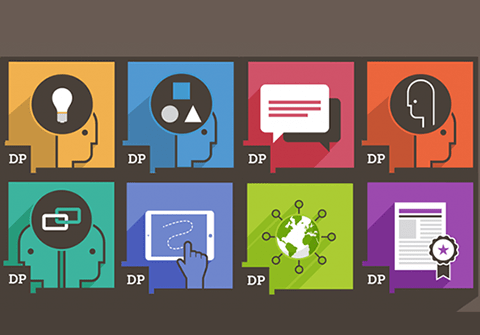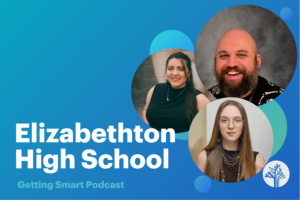What You Need to Know When Developing Micro-Credentials

Dr. Mary Ann Wolf
Many of us in education have experienced the two-hour workshop that leaves us excited with new ideas, but then leaves us frustrated when we come across the materials a couple of weeks later realizing that we had not done anything different in our classrooms or schools.
We didn’t necessarily know what to expect as we began our journey toward micro-credentials (sometimes called badges), but we were eager to explore the possibility of changing professional learning from seat-time to competency-base to encourage changes in practice. Nearly half of educators share that they are not satisfied with their professional learning experiences. While research identifies what it takes for professional learning to be effective, few teachers have the opportunity to engage in opportunities that are truly job-embedded, ongoing, connected to peers, and in the context of their own teaching (Darling-Hammond, Wei, 2009).
In an effort to help teachers apply what they learn in professional learning, the Friday Institute, in partnership with Digital Promise with funding from the Oak Foundation, set out to develop micro-credentials as a way to help teachers utilize what they learn to improve their practice. The Friday Institute focused the initial three stacks of micro-credentials on Learning Differences, a body of work supported by the Learning Differences Massive Online Open Course for Educators (MOOC-Ed). Teachers were encouraged to earn micro-credentials on three primary topics of the course: Motivation, Working Memory, and Executive Function.
Seven Lessons Learned from Implementing Micro-credentials
With over 300 submissions from teachers during the implementation this fall, the Friday Institute has learned many lessons that provide insight for those considering or developing micro-credentials. The whitepaper, Seven Lessons Learned from Implementing Micro-credentials, provides specific examples and more in-depth discussion about each of the following:
- Teachers who earn micro-credentials want to earn more
- Micro-credentials facilitate concrete applications to classroom practice
- Micro-credentials scaffold teachers to engage at an increased level of rigor
- Teachers can demonstrate competency/mastery in a variety of ways
- Instructional design and online platform matter
- Micro-credentials should not have a one-size-fits-all approach
- Many questions still exist around micro-credentials
Teachers want to pursue other micro-credentials.
As we think about the potential of micro-credentials to improve professional learning, several findings stand out as promising. Ninety-seven percent of respondents to our survey want to pursue additional micro-credentials. With micro-credentials, we have the opportunity to actually see how teachers change their practice with students. Developing the artifacts to submit may encourage or nudge teachers to go the extra step and try what they are learning with students. The artifacts submitted to earn the micro-credentials are actual examples from the classroom and allow us to see what they understand and learn.
Teachers may not earn the micro-credential the first time, but they try again.
Another unanticipated finding is that almost half of teachers did not earn the micro-credentials on the first attempt. However, nearly half of those who did not earn the micro-credential initially tried again and typically earned it on the next attempt. This allows the teachers to experience competency-based learning, and also provides more confidence in what they learn rather than simply measuring how long they sat through a course or workshop.
Making Personalized Professional Learning a Reality
Professional learning is imperative for the transition to digital-age learning, and micro-credentials provide a personalized experience for educators. They submit the artifacts that are meaningful to them, and they have opportunities to learn at their own pace and to resubmit the information if needed. As the landscape for micro-credentials continues to grow, teachers have the opportunity to pursue micro-credentials based upon their own needs and interests.
Seven Lessons Learned from Implementing Micro-credentials provides our initial findings on micro-credentials. Currently, micro-credentials are not the typical way that teachers earn continuing education units (CEUs), but we believe they are very promising. So much so, in fact, that we recommended the State of North Carolina consider implementing micro-credentials as a professional development option for teachers to achieve digital learning competencies. While teachers can display or share micro-credentials to demonstrate their learning, determining the currency for micro-credentials to be recognized for licensure and CEUs is still in its infancy. It is critical that we learn from these early experiences to build meaningful micro-credentials. For micro-credentials to help change the reliance on seat-time for professional learning and to offer personalized experiences for teachers, they must be credible and challenging to earn. Based upon the initial findings and lessons learned, the Friday Institute will continue to implement these micro-credentials and some new ones focused on teaching fractions this spring.
Dr. Mary Ann Wolf is the Director of Digital Learning Programs at the Friday Institute for Educational Innovation at NC State University. Follow Mary on Twitter, @maryannwolfed.
For more on Micro-credentials, listen to this podcast:
Stay in-the-know with all things EdTech and innovations in learning by signing up to receive the weekly Smart Update






SANJESH SHARMA
Really interesting article. The importance of the 'C' in continuing professional development is to often overlooked and ends up meaning that learning'decay' kicks in the moment teachers leave workshops and courses. This is one way to keep them learning. If we look to the success of Mozilla Open Badges towards student development, this will likely have a similar impact if implemented in a similar way.